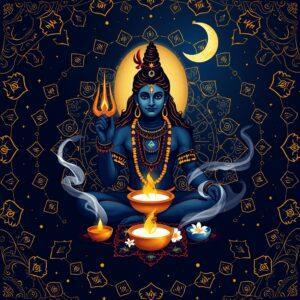
The arrival of a newborn brings immense joy and is celebrated with various traditions, including the beautiful Naamkaran ceremony. This sacred ritual, observed across different cultures in India, marks the formal bestowing of a name upon a child. Let’s delve deeper into this cherished tradition and its significance.
The Heart of the Naamkaran Ceremony
The Naamkaran ceremony is more than just naming a child; it’s an act of blessing, a prayer for the child’s well-being, and a symbolic welcome into the family and community. Rooted in ancient traditions, it reflects the spiritual and cultural values of Indian society. The chosen name, often guided by astrological considerations and family preferences, is believed to influence the child’s destiny and bring good fortune.
Curious about other ceremonies and rituals surrounding childbirth and early childhood? Explore our blog post on Hinduism: A Celebration of Diversity and Tradition to discover a wealth of information.
Regional Variations of Naamkaran
India’s rich diversity is reflected in the different ways Naamkaran is celebrated across its regions. While the core essence remains the same, the specific rituals and customs can vary, adding to the tapestry of Indian culture. For those navigating grief and loss, Hindu Rituals: A Guide to Coping with Grief and Loss might offer solace and guidance.
In Hindi-speaking regions, Vedic mantras and prayers often accompany the ceremony, led by a priest. Sanskrit names, rich in meaning and symbolism, are preferred. Marathi culture blends regional customs with the naming process, emphasizing auspicious timings and traditional attire.
Families settled abroad adapt the ceremony to their surroundings, sometimes blending Indian traditions with Western elements, creating unique intercultural experiences. Learn more about unique traditions in Aksharabhyasam at Sringeri: A Traditional South Indian Education.
Modern Adaptations and Global Influences
As families evolve and traditions adapt, modern Naamkaran ceremonies embrace a blend of old and new. Discover the rich history of Udupi Sri Krishna Matha: A Journey through History, Significance, and Practices.
Personalized touches, eco-friendly practices, and virtual participation are becoming increasingly common, allowing loved ones across the globe to join in the celebration. These adaptations demonstrate the enduring spirit of tradition while embracing the evolving needs of modern families.
Traditions and Rituals in Naming Ceremonies
- Candle Lighting: Symbolizing the light and warmth the baby brings into the world, a candle is lit, often passed around for guests to offer blessings and warm wishes for the child’s future. This intimate act creates a circle of love and hope surrounding the newborn.
- Sand Ceremony: Loved ones pour different colored sands into a jar, representing their unique contributions to the child’s life. It’s a beautiful visualization of family unity, creating a lasting keepsake of the special day.
- Time Capsule: To capture the essence of the moment, guests contribute items to a time capsule—letters, photos, newspapers—to be opened at a future milestone, offering a glimpse into the past and the love surrounding the child’s arrival.
- Tree Wishes: Guests write messages of wisdom and wishes on tags and hang them on a tree. These symbolic “leaves” of love and guidance represent the growth and flourishing hoped for the child’s life.
- Prayers and Blessings: Prayers and blessings are offered for the child’s future, invoking divine protection and well-being. These spiritual elements add depth and meaning to the ceremony.
- Respect for Elders: Seeking blessings from elders is an integral part of many naming traditions, reflecting the value of experience and wisdom in guiding the child’s journey.
- Symbolic Gestures, Readings, and Music: Symbolic gestures, readings, and music that resonate with the family’s values are often incorporated, enhancing the emotional depth and spiritual significance of the ceremony.
- Gift Exchange: The exchange of gifts and the signing of a symbolic certificate can serve as tangible reminders of the child’s impact on the family and the community’s embrace of their newest member.
Poojn.in: Your Partner in Celebrating Traditions
At poojn.in, we understand the importance of these sacred rituals. We offer a curated selection of authentic puja items and complete Naamkaran ceremony kits, designed to make your celebration seamless and spiritually fulfilling. From havan samagri and pure copper kalash to fresh flowers and garlands, we provide everything you need. Diyas (lamps), dhotis, and clay pots (ghats) are just a few examples of the essential items we offer.
Our customized kits cater to various regional customs, ensuring your ceremony aligns perfectly with your family’s traditions. We also offer bulk orders and pandit services for added convenience. Explore our Rakhi and Wedding Items collections for other special occasions.
Frequently Asked Questions About Naamkaran
What is the typical timing for a Naamkaran ceremony? The Naamkaran ceremony is traditionally held on the eleventh or twelfth day after the baby’s birth, though variations exist depending on regional customs and astrological considerations. In Kerala, for instance, it’s often celebrated on the 28th day. This flexibility allows families to choose a time that is auspicious and convenient.
What is the spiritual significance of giving a name? In Indian culture, a name is not just a label but a powerful blessing. It’s believed to influence the child’s personality, protect them, and guide their path in life. The name is chosen with care and often carries deep symbolic meaning.
Are there global equivalents to the Naamkaran ceremony? Absolutely! Many cultures around the world have naming ceremonies. While the rituals differ, the core idea of formally welcoming a child into the community and bestowing a name is a universal practice, highlighting our shared humanity.
Cherishing Traditions, Embracing the Future
The Naamkaran ceremony is a timeless tradition, a bridge between generations, and a beautiful celebration of new life. It is a testament to the enduring power of culture and the deep-rooted values that bind families together. As we celebrate the arrival of each new generation, let us continue to cherish these traditions, embracing the future while honoring the rich heritage that shapes our identities.
Visit poojn.in to explore our Naam Karan ceremony collections and get doorstep delivery across India. Our customer service team is available to assist you in selecting the right items for your needs, ensuring a memorable and meaningful celebration.
Note: Product availability and prices may vary. Please check our website for current information.


